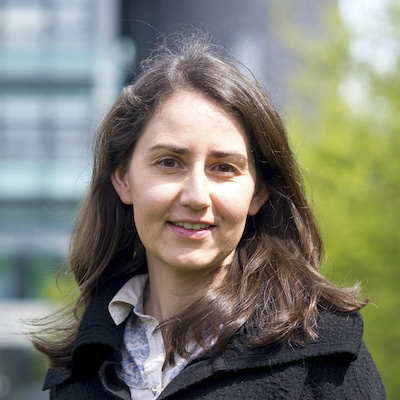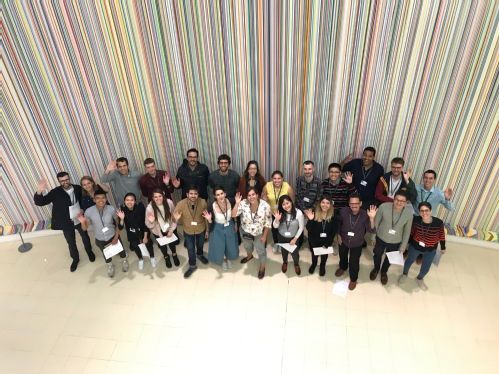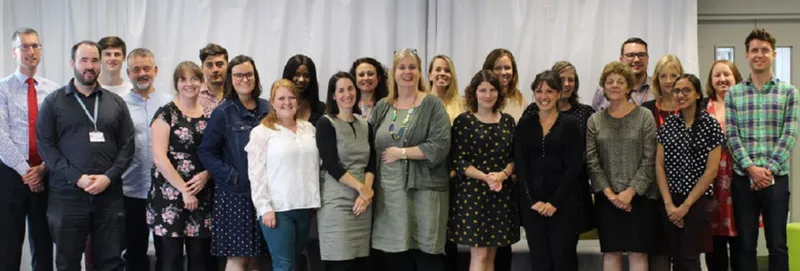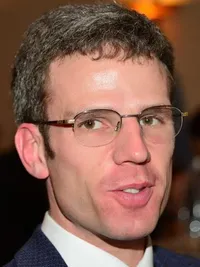Computer Science News
Dr Maria Liakata receives a Turing Artificial Intelligence (AI) Fellowship

We are please to report that Dr Maria Liakata has received a Turing Artificial Intelligence (AI) Fellowship.
The Fellowships from The Alan Turing Institute, the UK’s national institute for data science and AI, aim to attract and retain exceptional researchers in artificial intelligence. Covering a broad view of AI, including applications of foundational disciplines across mathematical sciences, statistical sciences, computational sciences and engineering, Fellows collaborate across disciplines and have the opportunity to collaborate with academia, industry, government and the third sector.
Dr Liakata’s Fellowship will focus on creating time sensitive sensors from language and heterogeneous user generated content. Commenting on the research she said:
“Wide spread use of digital technology has made it possible to obtain language data (e.g., social media, SMS) as well as heterogeneous data (e.g., mobile phone use, sensors) from users over time. Such data can provide useful behavioural cues both at the level of the individual and the wider population, enabling the creation of longitudinal digital phenotypes.
“Current methods in natural language processing (NLP) are not well suited to time sensitive, sparse and missing data, collected over time or personalised models of language use. The Turing AI fellowship will allow me to establish a new area in NLP on personalised longitudinal language processing.
“I plan to develop sensors for capturing digital biomarkers from language and heterogeneous user generated content to understand the evolution of an individual over time. I want to make a significant contribution to mental health by working with clinical experts to create new tools based on the sensors, making it possible to assess and measure conditions in between clinician appointments.”
To read more on this story, please click here.
Warwick and Alan Turing Institute partnership brings Data Science for Social Good Fellowship to the UK this summer

This year's Data Science for Social Good (DSSG) Fellowship programme is being held in the UK for the first time. The University of Warwick is hosting the Fellowships this summer in conjunction with the Alan Turing Institute. The 2019 programme is running from June 10 to August 28.
The Fellowship is a project-based training programme to supply data scientists with skills to create data-driven solutions to real-world problems. It trains aspiring data scientists to work on data mining, machine learning, big data and data science projects with social impact.
It was first pioneered by the University of Chicago, and since 2013 has seen more than 200 graduate and undergraduate students studying computer science, social sciences, statistics, public policy and other quantitative fields undertaking a DSSG Fellowship at the University of Chicago.
The Alan Turing Institute’s vision to advance research for public good and train the next generation of leaders is directly aligned with DSSG’s own goal to produce data scientists with strong skills in solving real-world problems.
Fellows work with non-profit and government partners around the world. To date, more than 60 projects have run, which have helped lots of organisations do more with their data, enhancing their services, interventions and outreach so that they can fulfil their mission of improving lives across the world.
Further details on the fellowship can be found here.
Dr Claire Rocks is a new WIHEA Fellow
Many congratulations to Dr Claire Rocks on her election to a Fellowship of the Warwick International Higher Education Academy.

A WIHEA Fellowship recognises and rewards outstanding achievements in learning and teaching and is an exceptional opportunity to engage with colleagues across the university, improve the student experience and make a genuine difference to Warwick through research, debate and policy formation.
Promotions for two academic staff
 We are delighted to report that Dr Theo Damoulas and Dr Gihan Mudalige have successfully completed their probations early, and become Associate Professors at the start of this month. Quoting from their probationary review reports,
We are delighted to report that Dr Theo Damoulas and Dr Gihan Mudalige have successfully completed their probations early, and become Associate Professors at the start of this month. Quoting from their probationary review reports,
Gihan has had a number of successes with attracting substantial research funding, most recently for two projects with AWE PLC, and one with Rolls Royce PLC. A further major success is Gihan’s Royal Society Industrial Fellowship, which will run over the next 4 academic years at 50% of Gihan’s time. ... Dr Gihan Mudalige is an outstanding and valuable member of the department’s academic staff, whose many likely future contributions to both research and teaching we are looking forward to.
and
Dr Theo Damoulas is a valuable asset to both Computer Science and Statistics departments in all of the research, teaching, administration and collegiality areas. Theo is already a next-generation research leader at the national and international levels, in particular enhancing the university's partnerships with the Alan Turing Institute, CUSP London, King's College London, and New York University.
it remains to say many congratulations!
Mathematical Sciences Building 'topped out'
 Thursday 1 March saw the university's Mathematical Sciences Building project officially 'topped out': an event celebrating the construction as it reaches its highest point.
Thursday 1 March saw the university's Mathematical Sciences Building project officially 'topped out': an event celebrating the construction as it reaches its highest point.
To mark the occasion, representatives of each of the Computer Science, Statistics and Mathematics departments decorated a central roof steel beam with an illustration of their subject. For our department, Professor Mike Paterson FRS drew his gadget for proving that the planar 3-colourability problem is NP-hard, a piece of research from the first decade of Computer Science at Warwick that is still fundamental today and being taught to our students. Professor Paterson commented:
I am delighted to have played a part in this momentous and happy event, that celebrates the many contributions of those involved in this project as well as those who have worked towards the three departments reaching this milestone. The state-of-the-art building, constructed by local people, will foster internationally leading collaborative research and teaching in our three rapidly growing subjects.
Dr Laurent Doyen is a new Rutherford Visiting Fellow
 The Department will be welcoming Dr Laurent Doyen of CNRS and ENS Paris-Saclay as a Rutherford Visiting Fellow in 2018/19. This prestigious funding, whose aim is to attract top global talent into the UK, will allow Dr Doyen to collaborate closely with Dr Laure Daviaud, Dr Marcin Jurdzinski and Dr Ranko Lazic of DIMAP, as well as Dr Nathanael Fijalkow of the Alan Turing Institute, on cutting-edge research on fast algorithms for synthesis of safe, smart and adaptive controllers.
The Department will be welcoming Dr Laurent Doyen of CNRS and ENS Paris-Saclay as a Rutherford Visiting Fellow in 2018/19. This prestigious funding, whose aim is to attract top global talent into the UK, will allow Dr Doyen to collaborate closely with Dr Laure Daviaud, Dr Marcin Jurdzinski and Dr Ranko Lazic of DIMAP, as well as Dr Nathanael Fijalkow of the Alan Turing Institute, on cutting-edge research on fast algorithms for synthesis of safe, smart and adaptive controllers.
Professor Graham Cormode, the University of Warwick and Alan Turing Institute Liaison Director, commented:
Dr Doyen's Rutherford Visiting Fellowship will provide a major boost to building world-leading and long-lasting collaborative links among the Alan Turing Institute, the DIMAP multi-disciplinary research centre at Warwick, and LSV at ENS Paris-Saclay. The latter is an established European centre of excellence in logical aspects of computer and data sciences.
BBSRC funding success for Till Bretschneider
Prof Till Bretschneider has been successful with a £0.5M BBSRC grant application ‘Reconstructing cell surface dynamics from lightsheet microscopy data’ and will work with a team at MRC LMB Cambridge (Dr Rob Kay) and the Warwick Medical School (Prof Andrew McAinsh and Dr Karuna Sampath) on this research from October 2017. They will develop new image-based computational modelling tools to investigate the biochemical regulation and physical forces that shape the cell membrane during cell motility and uptake of fluid. Both are important processes in embryonic development, tumour metastasis, and the immune response. The work will benefit from state of the art microscopy in Warwick’s Advanced Bioimaging Research Technology Platform that allows to acquire time series of 3D scans of single cells at high spatial and temporal resolution.
